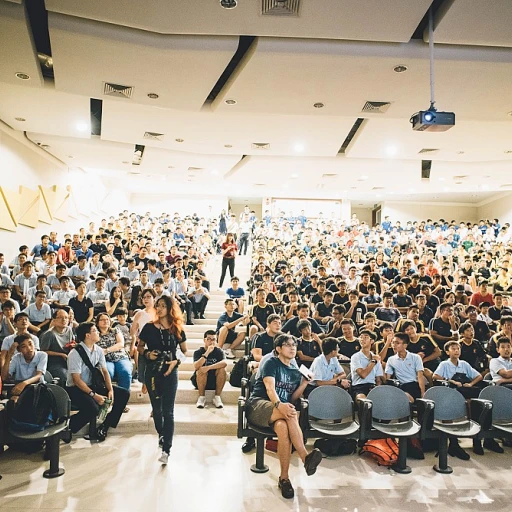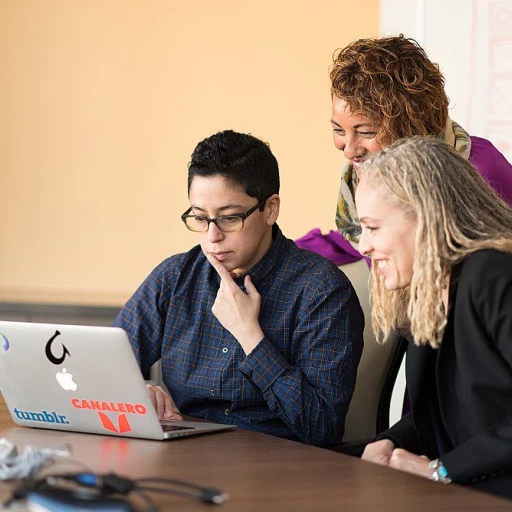
Defining the Skills Development Facilitator
Introducing the Role of a Skills Development Facilitator
A Skills Development Facilitator (SDF) plays a pivotal role in the modern workplace, acting as a bridge between employees and training programs. This position is at the heart of talent management, particularly in regions like South Africa. But what exactly does this role entail? Let's delve into the critical function an SDF serves within a company. The primary responsibility of a Skills Development Facilitator is to coordinate and manage the skills development and learning initiatives within an organization. This often involves aligning training activities with the strategic objectives of the business, ensuring that employees are not only up to date with industry standards but also primed for career growth — a key element of career development. Skills Development Facilitators work closely with both employers and employees to craft effective workplace skills plans. They are responsible for developing and implementing training strategies that support the overall goals of the organization. This includes overseeing learning interventions and identifying future training needs. Moreover, SDFs liaise with education and training authorities such as SETA (Sector Education and Training Authority) to ensure that development programs meet regulatory requirements. Their understanding of the labor market plays a significant role in tailoring programs that facilitate career advancement and employee engagement. To further understand how critical this role is in guiding companies towards sustainable growth, explore why employers are prioritizing employee competencies in the talent management landscape. Explore more about the significance of prioritizing competencies.Importance in Talent Management
The Role of Skills Development Facilitators in the Work Environment
Understanding the dynamic landscape of talent management, skills development facilitators (SDF) play a crucial role in enhancing workforce capabilities. Their primary aim is to aid in the seamless integration of skills development plans into the organizational framework. By doing so, they help bridge gaps between employees' current skills and the skills required by employers, adapting to the ever-evolving needs of the labor market. Skills development facilitators have a multi-faceted role that goes beyond just planning educational initiatives. They contribute towards facilitating career development by organizing learning interventions and programs that cater to individual career aspirations and broader company goals. These initiatives not only enhance skills and will in talent management but also align with national policies like those advocated by the South African Sector Education and Training Authority (SETA). Incorporating effective workplace skills and training programs ensures a comprehensive approach to skill enhancement. The SDF's involvement extends to planning annual training courses, evaluating employee competencies, and ensuring that development training meets the requirements of both the business and its workforce. Moreover, these facilitators play a pivotal role in fostering a learning environment. They effectively utilize career counseling, emphasizing the importance of continuous education and training certifications, which significantly impact employee productivity and satisfaction. A well-executed skills plan not only meets immediate workforce demands but also prepares the organization for future challenges. This forward-thinking approach ensures that employees remain competitive in the labor market, thus boosting overall morale and retention within the company. While challenges exist, effective strategies can lead to robust workplace skill enhancements, paving the way for organizational growth and talent retention.Key Competencies and Skills Required
Essential Competencies for Effective Facilitation
To navigate the multifaceted role of a skills development facilitator (SDF), a combination of technical, interpersonal, and strategic competencies is crucial. First and foremost, a deep understanding of skills development within the context of both the organization and the labor market is essential. This understanding enables facilitators to tailor initiatives that align with company goals and workforce needs.
Communication and Interpersonal Skills: These skills are fundamental, as the facilitator must frequently engage with diverse stakeholders, including employers, employees, and training providers. Listening actively and conveying complex concepts simply enhances collaboration and buy-in from all parties involved.
Analytical Skills: Regard as a cornerstone, these skills help assess training needs and identify gaps within the existing workplace skills plan. By analyzing these gaps, facilitators can design tailored learning programs that promote both career growth for employees and meet strategic organizational goals.
Strategic Planning: The ability to formulate effective skills development plans and strategies is integral. This involves not only understanding the current capabilities of the workforce but also predicting future trends and needs. Crafting a comprehensive annual training plan requires foresight and strategic acumen.
Understanding of Education and Training: A comprehensive grasp of training methodologies and career development programs is vital. Facilitators often curate learning interventions and training programs that cater to the unique needs of the business and its employees. As such, a background in education training systems, particularly those recognized by the SETA in South Africa, becomes advantageous.
Digital literacy is increasingly important as well, especially in a world where learning and development are rapidly transitioning online. Facilitators need to be adept at using various digital platforms to deliver courses and track employee progress effectively.
Finally, navigational agility in employment equity and understanding how to leverage it for career advancement opportunities is a key aspect of modern facilitation. Staying abreast of evolving workplace dynamics ensures that the SDF can remain relevant and impactful in their role.
Challenges Faced by Skills Development Facilitators
Navigating the Challenges of Being a Development Facilitator
The role of a Skills Development Facilitator (SDF) is multi-faceted and demands navigating a variety of challenges. Understanding the unique difficulties faced by these professionals is essential for those seeking to enhance the effectiveness of talent management programs. One of the primary challenges is adapting to the rapid pace of change in the global workplace. Development facilitators must ensure that training programs and learning interventions remain relevant and cater to evolving needs of businesses and employees. This requires a commitment to continuous learning and staying updated with emerging trends in skills development and career training. Another challenge is aligning the diverse needs of a company's workforce with its strategic goals. An SDF must craft a comprehensive skills plan that not only responds to individual employee aspirations but also supports the broader objectives of the organization. Balancing these often contrasting priorities calls for adept negotiation skills and a deep understanding of the company's culture and ambitions. Furthermore, maintaining compliance with regulatory requirements, such as those outlined by SETA in South Africa, adds another layer of complexity. Development facilitators must be vigilant in updating and documenting their work to adhere to legislative standards and secure necessary certifications. This often involves collaborating with various stakeholders to ensure that education and training interventions meet regulatory criteria. Lastly, limited resources can hinder the implementation of effective skills programs. Facilitators must be adept at maximizing the impact of available resources by strategically planning training courses and leveraging available technology to create efficient and impactful learning opportunities. By understanding these challenges, organizations can better support their development facilitators in creating successful learning environments, ultimately fostering a thriving workforce.Strategies for Effective Skills Development
Strategies to Enhance Career Growth Through Skills Development
Fostering a robust training and development framework is vital for any company looking to retain top talent and boost productivity. Skills Development Facilitators (SDFs) play a pivotal role in shaping these workplace skills initiatives. Here are some effective strategies:
- Customized Training Programs: Relevance is crucial. Tailor training programs to align with the specific needs and goals of the company and its employees. Customized learning interventions ensure that development efforts are directly applicable to career development and result in a more motivated workforce.
- Utilizing Online Courses: Embrace technology to offer flexible online courses that accommodate diverse learning styles and schedules. This can be particularly beneficial for facilitating education training in South Africa, where access can sometimes be a hurdle.
- Encourage Experiential Learning: On-the-job experiences and real-world projects enhance skills development by allowing employees to apply new knowledge immediately. Development facilitators should encourage mentoring and job rotation programs to diversify skill sets.
- Regular Skill Assessments: Consistent evaluation of employee skills helps in identifying gaps and planning appropriate learning development interventions. This approach aids the development facilitator in tracking progress and adjusting the annual training plan as needed.
- Integration with Career Counseling: Combine skills training with career counseling to help employees understand career paths and set achievable goals. This dual approach boosts employee engagement and ensures that skill enhancement aligns with personal career aspirations.
- Collaboration with SETAs: In places like South Africa, collaborating with Sector Education and Training Authorities (SETAs) is essential to ensure that training programs meet national standards and benefit from possible funding opportunities.
Incorporating these strategies into the skills plan not only enhances employee capabilities but also contributes to the competence of the labor market. As challenges in the field evolve, a proactive approach to development remains key for SDFs and businesses alike.
Future Trends in Skills Development
Emerging Trends in Skills Development
The landscape of skills development continues to evolve, and it's crucial for businesses, employees, and skills development facilitators (SDFs) to stay abreast of emerging trends. As workplaces and labor markets shift, proactive understanding of these trends can significantly benefit companies and their workforce.- Increased Emphasis on Lifelong Learning: With rapid technological advancements, the need for continuous learning has never been more prominent. Companies are investing in ongoing education and training programs, promoting a culture of lifelong learning to ensure their employees remain relevant in a dynamic work environment.
- Integration of Digital Learning Platforms: Digital transformation extends into the realm of skills development, where online courses and e-learning solutions are becoming integral to skills plans. These platforms provide flexible opportunities for employees to engage in learning interventions that support both personal growth and company objectives.
- Personalized Learning Pathways: Understanding that one size does not fit all, employers are developing personalized training and development plans. Tailoring career development paths to individual employee needs enhances role effectiveness and boosts workplace motivation.
- Collaborative Learning and Open Education Resources: The shift towards collaborative learning environments allows employees to gain insights through shared experiences and open education resources, fostering a community-driven approach to skills development.
- Focus on Soft Skills and Emotional Intelligence: As technical skills are no longer the only measure of employee competency, SDFs are placing greater emphasis on soft skills training. Development facilitators are integrating training programs that enhance employees' emotional intelligence, effective communication, and problem-solving abilities.













